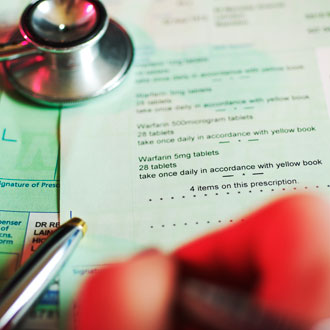Seven ways to deal with drugs shortages

Finding out that drugs are out of stock or unavailable is annoying, but dealing with the consequences increases workload and takes up GP time. GPs are increasingly reporting problems at the patient’s end of the supply chain that create new tasks, interrupting clinical sessions and creating a backlog of paperwork.
The following seven tips recommend approaches to take when you experience drugs shortages so that you can minimise the workload, and decrease the risks involved when changing a patient’s prescription.

1 Don’t try to go it alone
Generally if a drug is not available in a pharmacy it is up to the pharmacy to search out an alternative supply. Only as a last resort should the GP be contacted and asked for a different product. The onus of supply is on the pharmacy. However, if the drug cannot be sourced it is not their fault.
In the event that a drug cannot be supplied then the nearest alternative should be prescribed by the GP. For ‘acute’ prescriptions this is usually not too problematic, but may take a bit of research in the BNF and other sources. For a long term-prescription, a similar drug can usually be prescribed, but this is not ideal and may have adverse consequences.
An individual GP or practice should not try to ‘go it alone’ in the event of a drug shortage and a collective decision about what to do should be made for practices and in the area – ideally with the CCG working alongside local hospitals and issuing advice.
CCGs and health boards have been providing advice on how to substitute for various drugs and a rough dose equivalence of substitute drugs. Obviously this is a compromise, but in the absence of the original drug it may be the safest option.
But it is better to be forewarned and plan what to do if these situations arise. Before you discover that certain drugs are unavailable and decide what the practice response will be in advance rather than having to think
on the hoof.
Also, after prescribing an alternative, you may need to review and see if the substitute is working or check blood tests. For example, with ACEIs or ‘sartans’ you should check renal function (U&Es) a week after any change, as sometimes altering the drug and dose can disturb renal function.
Dr Martin Duerden is a GP in Conwy and a clinical adviser to RCGP on prescribing
2 Request an ‘out-of-stock list’
Our LMC has forged very good relations with the local pharmaceutical committee (LPC), which provides us with a monthly update of shortages that we forward to GP practices.
This list says which items are unavailable, hard to obtain or running short in the market.
It gives the item status and provides other information. For example, last month loperamide capsules were unavailable in packs of 30, and the out-of-stock list recommended that the GP either get the prescription amended to loperamide tablets or use packs of 12 capsules instead.
The ‘more info’ and ‘status’ sections can explain:
• Why the shortage has occurred (for instance, manufacturing issues).
• Which manufacturers have made the drug available.
• What alternatives are available (and whether they are generic).
• Whether particular varieties are hard to get.
• Whether a product has gone up or down in price (and by how much).
• How much current alternatives cost.
• When the product will come back in stock (if known).
It is not an exhaustive list, and some pharmacies will have more trouble than others obtaining certain items. But get in touch with your LMC to see if they already offer this, or whether they would be able to set it up if not.
At our LMC, the chair and secretary meet informally with their counterparts from the LPC on a regular basis, to discuss any current issues that may affect them both. The idea for setting up an out-of-stock list emerged from these meetings, as did guidelines for pharmacies and GP practices about pharmacy repeat ordering, also produced by the LPC and approved by the LMC, at its meeting.
Dr Mark Bond is chair of Sefton LMC and a GP in Southport; Dr Lisa Manning is the CEO of Sefton Local Pharmaceutical Committee

3 Write a crib sheet for alternative prescriptions to put on your intranet
On a busy day when you get prescriptions back to change, a simple administration task can make life easier. Duty doctors can scribble down the drugs they have been asked to change over a month. Then they can allocate a GP or practice manager to look at these commonly returned prescriptions and the reasons (whether financial reasons or sourcing) and list some common alternatives, suggested by the pharmacy, the prescribing adviser or the BNF. Dosage equivalences and cost should be included.
These are then put onto a collective email or added to the practice intranet to be accessed by medical staff if prescriptions are returned.
Dr Tracey Vell is honorary secretary of Manchester LMC and a GP in the city
4 Prescribe generically where possible
Prescribing medicines generically will potentially give pharmacies more options to fill prescriptions if there are medicines shortages.
This strategy may not solve all the problems, but it is a good place to start. GPs have to be mindful that they may be asked to re-prescribe a medicine in tablets rather than capsules, or the medicine might have to change completely within its class (for instance, ACE inhibitors).
Good communication between the pharmacy and GP practice can help the patient to get their medicines with the least inconvenience. For example, if patients tend to use one particular pharmacy locally, ask a member of staff responsible for repeat scripts to call the pharmacy for five or 10 minutes at the beginning of each week to get the latest information on shortages.
Long-term medicines shortages, which are often reported with resolution dates of months, and sometimes years, need to be prioritised for action and alternative medicines found.
Out-of-stock bulletins are available from some wholesalers and LPCs. Resources can be found in the references.1
Cathal Daly is the prescribing lead and prescribing adviser for NHS South Norfolk CCG
5 Double-check there is no stock left locally
Some reported medicines shortages are very transient, caused by a short-term demand outstripping supply.
Pharmacies will usually have one lead priority wholesaler from whom the majority of their medicines are supplied. If that wholesaler is experiencing a supply problem from the manufacturer, the pharmacy will too. But it may be a supply problem particular to that wholesaler alone.
It would therefore be worth getting your own clinical staff to call other pharmacies that are supplied by different wholesalers to find out if they are experiencing the same difficulties. They can escalate queries that require a different prescription to a GP or nurse.
Cathal Daly is the prescribing lead and prescribing adviser for NHS South Norfolk CCG
6 Check the Pharmaceutical Services Negotiating Committee (PSNC) website for a list of price concessions
When a generic shortage occurs, the medicine price typically rises steeply – a doubling or trebling is normal and this year some lines have seen a 17-fold increase. When prices rise, the PSNC seeks agreement from the Department of Health to adjust reimbursement prices – a ‘price concession’.
The list of concessions shows those agreed each month and so gives an indication of the incidence of shortages.2 Although this indication may be of interest to GPs looking to confirm which medicines are in short supply, the list is not comprehensive and it does not show the level or extent to which pharmacies are struggling to obtain medicines. The concessions list gives an indication of medicines in short supply and so it would be helpful for prescribers to check it every month so that they are aware of potential problems.
Note that the list does not necessarily reflect local situations, so there is no need for prescribers to take immediate action when medicines appear on it.
It may be helpful to set up email reporting groups, for example, so that when pharmacies are having real problems obtaining medicines they can easily advise prescribers of the fact.
Prescribers having problems with serious shortages should report these to their LMCs, who can push for national clinical guidance from the DH, as has happened previously in some cases where shortages have been significant.
Situations vary regionally and change continually, so as generic shortages are likely to remain a feature of practice, local systems must be in place to ensure patients can obtain medicines without burdening practices with prescription change requests. GPs and CCGs should work with LPCs to establish these systems, developing reliable information flows and reporting systems along with mechanisms to address the problems, including supplies of alternative medication if necessary.
Komal George is head of support services at PSNC
7 Access your local medicines information service
As GP members, ensure your CCG is doing the best it can by commissioning services to help cope with shortages. For example, you should have access to a primary care medicines management team (MMT)consisting of at least one very senior pharmacist with leadership skills, and two to three more people (ideally a more junior pharmacist, an experienced senior technician and some part-time admin support).
If a GP has no access to an MMT, the LMC should be able to help raise the profile of the issue, and GPs as CCG members should have influence in their own right, particularly if they are members of the clinical executive or governing body.
Ideally, one member of the CCG’s MMT could specialise in procurement and supply issues. This role involves keeping abreast of national issues by scanning the numerous information sources, and producing a monthly bulletin for both local doctors and pharmacists.
NHS Southampton CCG has also found that using the Electronic Prescription Service helps GPs and their local community pharmacists to communicate more quickly.
In most areas, GPs now have access to a local medicines information service, which may also provide specific advice where the CCG cannot meet your needs. Contact numbers for these services appear on the inside front cover of the BNF. You can ask for specific advice on products with a national supply problem, as well as anticipated timeframe, and alternative options if applicable.
Julia Bowey is the head of medicines management at NHS Southampton City CCG
Pulse July survey
Take our July 2025 survey to potentially win £1.000 worth of tokens

Visit Pulse Reference for details on 140 symptoms, including easily searchable symptoms and categories, offering you a free platform to check symptoms and receive potential diagnoses during consultations.











